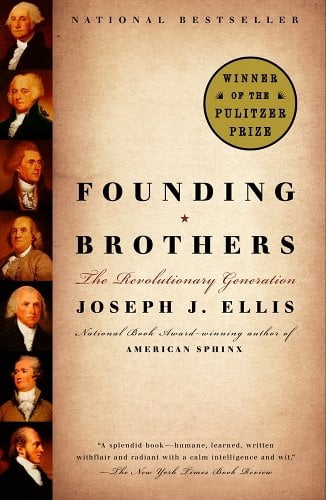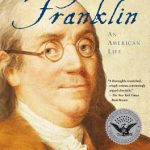As I’ve scoured the lists of books about revolutionary America for a book to read for my own education, I struggled to find one that covered a variety of people (I love biographies, but I can’t read one about everyone!) and eras (I would love to learn about all eras of the revolution, from the pre-revolution, the actual war years, to the beginning of the republic and later political fall out). At the same time that I’m I’ve been searching for the perfect book about the revolutionary era, I remembered I had picked up a used copy of Founding Brothers: The Revolutionary Generation by Joseph Ellis (Vintage Books, 2000) in a previous year’s book sale. I decided it was the book to read right now.
I was expecting Founding Brothers to be a collection of mini-biographies about the “brothers” of the revolutionary generation. Or maybe it would be about the Constitutional Convention and how they all worked together. Honestly, I did not know what it was, but any expectations I did have were far surpassed in Ellis’s complex portrait of the generation that founded the country. His work is both thorough and completely readable.
Ellis carefully delves in to the personalities that seem so elusive and magically gigantic to us today, more than 200 years later. While the chapters are loosely based on significant happenings (“The Duel” of Hamilton and Burr, “The Silence” on slavery, “The Friendship” between Adams and Jefferson, for example), the chapters are each far more than a description of a single event. Each chapter covers multiple people, multiple eras (from pre-Revolutionary to the War of 1812), and multiple places in the world picture (France and England as well as New York, Philadelphia, and Virginia).
Somehow, Founding Brothers also manages to provide those mini-biographies I’d hoped for. I feel that Washington, Adams, Jefferson, and so forth are less complex and more real to me than they were before I read the book. Ellis seems to understand the ideals we have of these people, and his book brings them back to earth. Washington was elusive to his peers, just as much as he is to us today. There are reasons Jefferson reigns triumphant in our modern memories versus Adams.
Founding Brothers is not a light read, because Ellis fully realizes that the issues those people dealt with were not “light.” Their era was full of complexities, and Founding Brothers attempts to bring the complexities into a clear picture. And in this, the book succeeded for me. I say it was “readable” because for me I felt like the process of reading it was bringing a fuzzy image into focus. It was beautifully written, and I didn’t feel anything was extraneous. I read slowly and carefully to get all the details, and I loved how Ellis approached the issues and explained things for me, a lay reader. I am not an historian and this book was very enjoyable. That is a mark of success.
There may be some aspects of the revolutionary era, the personalities involved, and the politics that are still a bit unclear, but as a whole, Founding Brothers has helped me better see the entire picture. It’s a work that I believe I will revisit again in my personal life journey towards understanding history and America. There is a wealth of information packed in the stories and pages, and I know more is left to understand.
Ellis received the Nonfiction Pulitzer Prize in 2001 for this work, and I can whole-heartily endorse that awards committee in their decision. If I had to suggest just one book about the revolutionary era to help one gain a better understanding of it, Founding Brothers is the comprehensive and magnificent work I’d suggest.






I read this one shortly after it came out for the same reasons you did and enjoyed it a ton. I thought it offered the perfect blend of overview and mini-biographies, like you describe. I thought he was very honest in his portraits and made the Founding Brothers feel like real, modern people, not dusty old historical figures.
Rose City Reader » exactly! They WERE real, and I loved how Ellis managed to bring them to “life”.
During my first year in ROTC in college, Founding Brothers was the required text for my first military science class. I don’t recall being impacted so strongly by it…but I was also rather sleep deprived. I also don’t think I’d realized it won a Pulitzer. Your review makes me want to go back and check it out again.
neal » I really liked it! I think it’s well worth a regular reread.
I know you said it was a “readable” book. My question is about how much information is given at a time. Did you feel overwhelmed by the amount of information, or was it just the right amount? Do you think your background and prior knowledge made the book an easier read? I’m always interested in those answers for nonfiction reads because some can be super heavy and difficult to comprehend.
Rebecca Scaglione » I think it was just the right amount of information! But I’m a very fast reader and I made myself slow down as I read it. So maybe in that respect it does have more than meets the eye. I feel like my background knowledge helped but I also felt that Ellis took the challenge of bringing familiar names, dates, and events and making them real, so we start with what we already know and build on that. If I reread it in a year I’ll bet I’ll learn even more. There is so much in there I KNOW I didn’t get it all. Federalism/anti-federalism is a complicated bit of politics and politics in general were quite different in that era, and those are things I hadn’t realized to such an extent before.
So in short, it is possible a different reader could be overwhelmed by the amount of info. But I take my nonfiction reads with the understanding that it is one perspective and that I will have to approach the subject repeatedly from different perspectives or rereads to completely understand. For me it was a perfect balance of both depth and not too much at a time. I hope it works for you too!
I’m going to recommend this book to my husband. I used to be bored by the very idea of reading history for pleasure, but last week on our first night out in a month, regaled me with details from the book 1861 by Adam Goodheart. There were so many amazing anecdotes about the reshaping of ours country – to the details of when clothes first needed to be uniformly sized – for uniforms! Now I have two history books to read. Since history is determined so much by the pov, I’ll consider them to be creative nonfiction!
leslie lehr » I love history! I hope you find something you’ll enjoy.